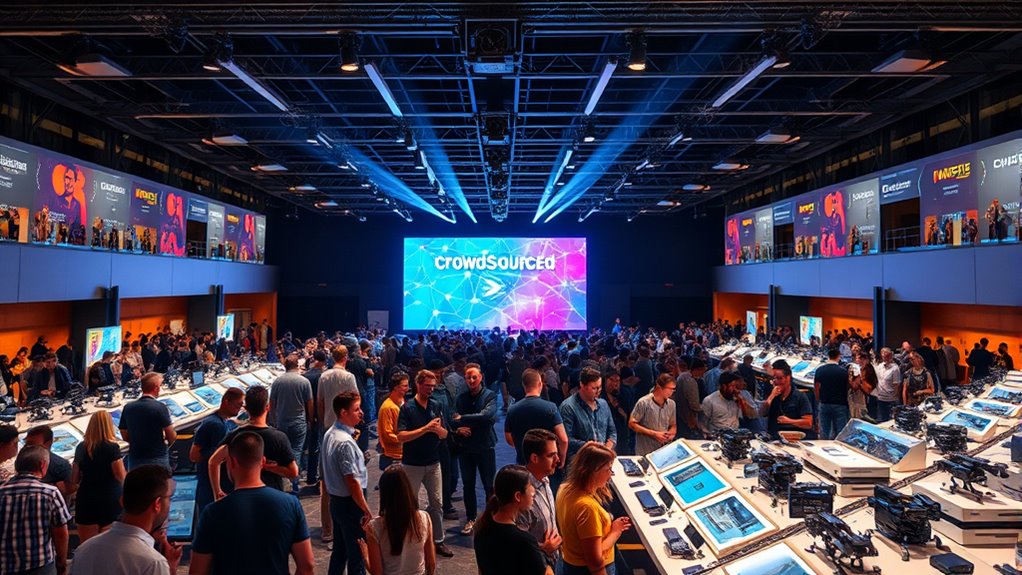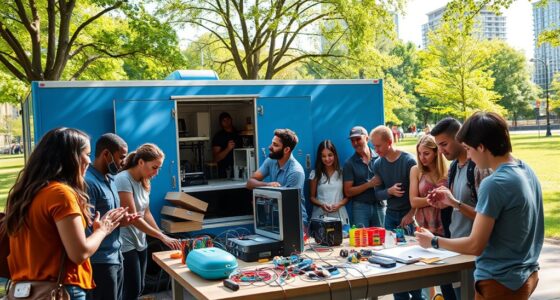Crowdsourcing has revolutionized industries by tapping into collective intelligence for innovation, data collection, and problem-solving. Platforms like OpenStreetMap and Waze improve navigation and crisis response, while Lego Ideas involves fans in product design, boosting loyalty and creativity. Citizen initiatives, such as CitySourced, enhance governance, and projects like Zooniverse accelerate scientific research. If you’re curious, exploring these breakthroughs can reveal how collaboration reshapes the way industries evolve and thrive.
Key Takeaways
- OpenStreetMap’s crowdsourced geographic data powers navigation, disaster response, and urban planning worldwide.
- Lego Ideas leverages community voting to co-create popular products, revitalizing the brand and accelerating innovation.
- Citizen reporting apps like CitySourced improve municipal responsiveness and civic engagement through crowdsourced issue tracking.
- Platforms like Zooniverse enable volunteers to analyze scientific data, expediting research and fostering global collaboration.
- Crowdsourcing enhances data collection and verification, improving the accuracy and scalability of AI and machine learning applications.

Crowdsourced innovations are transforming how we develop and improve products, services, and systems by tapping into the collective intelligence of communities worldwide. This collaborative approach leverages the power of large groups to generate ideas, improve data quality, and solve complex problems faster than traditional methods. One of the most prominent examples is in mapping and navigation. OpenStreetMap (OSM), with over 11 million contributors, continuously updates geographic data for free use. Your contributions help support navigation apps, disaster response, and urban planning, providing real-time crisis mapping during emergencies. Waze, another crowd-powered app, uses user-generated traffic data to optimize routes and deliver current road conditions. Unlike static GPS systems, Waze’s dynamic updates improve accuracy, and its success led Google to acquire it in 2013 for $1.3 billion, highlighting the commercial value of crowdsourced data.
Crowdsourcing also revolutionizes product innovation and design. Lego Ideas invites fans to submit and vote on new set ideas, many of which become actual products. Over 200 Lego sets, including themes like Ghostbusters and Minecraft, originated from user input. By involving consumers directly, Lego boosts brand loyalty and revitalizes its innovation pipeline. This model helped the company recover from financial struggles, proving that crowdsourcing can invigorate established brands and lead to successful new offerings. Additionally, the integration of collective intelligence accelerates the development of innovative solutions in various industries.
Lego Ideas engages fans in designing new sets, boosting loyalty and fostering innovative products through crowd input.
In the civic sphere, crowdsourcing enhances government responsiveness and community engagement. The CitySourced app allows citizens to report non-emergency issues like potholes or environmental hazards, enabling faster municipal responses. After Hurricane Katrina, the Katrina PeopleFinder Project mobilized over 4,000 volunteers to locate missing persons, demonstrating how crowdsourcing can aid disaster recovery. Similarly, the Citizen Archivist program at the US National Archives engages volunteers in transcribing and tagging historical documents online, making archives more accessible. These platforms foster collaboration between governments and citizens, improving governance and crisis management.
Science and academia also benefit from crowdsourcing. Projects like Zooniverse enlist millions of volunteers to analyze scientific datasets, such as lunar images, accelerating research that would take much longer otherwise. MIT’s Climate CoLab crowdsourced ideas to combat climate change, receiving over 10,000 proposals, some of which, like HEAT technology, have real-world applications. Initiatives involving school children, like MyMachine, foster early innovation and connect students with higher education researchers. These collective efforts expand research capacities and help address global challenges. Furthermore, the engagement of diverse communities ensures a wider range of perspectives and ideas, enriching the innovation process even further.
Data collection and verification have also been transformed by crowdsourcing. Companies like CrowdFlower provide platforms for businesses to outsource data labeling and validation tasks. Local contributors help enhance databases, such as StreetCred, which gathers data on businesses and points of interest. This approach improves the accuracy and scalability of data used in AI and machine learning, making technology smarter and more reliable. Overall, crowdsourced innovations are reshaping industries by harnessing the collective intelligence of communities, driving faster, more creative, and more inclusive progress across sectors.
Frequently Asked Questions
How Do Companies Protect Intellectual Property in Crowdsourced Projects?
To safeguard your intellectual property in crowdsourced projects, you need clear contracts that assign IP rights and formalize transfers through assignment agreements. Obtain licenses for successful ideas and require contributors to identify all collaborators. Conduct third-party checks to prevent IP claims, design tasks to minimize infringement risks, and choose platforms with strong confidentiality measures. Implement robust data protection and ensure compliance with IP laws to secure your innovations effectively.
What Are the Biggest Challenges in Managing Large Crowdsourcing Initiatives?
Managing large crowdsourcing initiatives presents several challenges. You’ll face low engagement, making it tough to gather quality contributions. Designing effective processes is vital to prevent misunderstandings and poor submissions. Coordinating numerous contributors requires strong oversight, especially to maintain quality control amid data variance. You also need to address intellectual property risks, secure sensitive data, and motivate participants continuously to guarantee ongoing commitment and high-quality results.
How Can Small Startups Effectively Leverage Crowdsourced Innovation?
You can leverage crowdsourced innovation effectively by choosing the right platform that matches your goals and target audience. Clearly define your challenges and provide specific criteria to guide participants. Engage relevant demographics through targeted outreach like industry forums or hackathons. Offer feedback and encourage iteration to refine ideas. Additionally, manage intellectual property rights carefully to protect your innovations, and foster community involvement to maximize participation and quality solutions.
What Ethical Considerations Arise From Crowdsourcing Ideas and Solutions?
Imagine a double-edged sword—crowdsourcing offers incredible benefits but also raises ethical concerns. You must guarantee community voices aren’t excluded during organization, protect intellectual property rights, and promote inclusivity. Be transparent about goals and processes, avoid biased evaluations, and fairly recognize contributors. Additionally, safeguard confidential data, comply with legal standards, and foster ongoing community involvement. Balancing innovation with ethical responsibility ensures your crowdsourcing efforts build trust and integrity.
How Do Crowdsourced Innovations Impact Traditional R&D Departments?
You see that crowdsourced innovations reshape traditional R&D by broadening ideas and speeding up processes. You’re likely to manage more external input, requiring new coordination skills and collaboration models. While it doesn’t replace in-house R&D entirely, it shifts roles toward managing external solutions and validating results. This approach helps you solve complex problems faster and more cost-effectively, but it also demands adapting workflows and fostering open, collaborative cultures within your organization.
Conclusion
Just like a flock of birds guiding each other through the sky, crowdsourced innovations show that when you unite diverse minds, you create a powerful force for change. Your ideas, no matter how small, can spark a ripple that transforms industries. Embrace the collective wisdom around you—because together, you hold the key to shaping the future. Remember, even the tiniest spark can ignite a wildfire of progress, illuminating paths no one ever thought possible.










